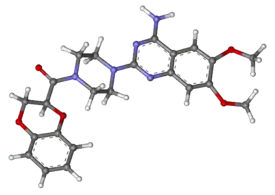Doxazosin
Doxazosin, sold under the brand names Cardura among others, is a medication used to treat symptoms of benign prostatic hyperplasia (enlarged prostate) and hypertension (high blood pressure).[1][2] For high blood pressure, it is a less preferred option.[2] It is taken by mouth.[2]
 | |
 | |
| Clinical data | |
|---|---|
| Pronunciation | /dɒkˈseɪzəsɪn/ dok-SAY-zə-sin OR /ˌdɒksəˈzoʊsɪn/ DOK-sə-ZOH-sin |
| Trade names | Cardura, Carduran, others |
| AHFS/Drugs.com | Monograph |
| MedlinePlus | a693045 |
| License data | |
| Pregnancy category |
|
| Routes of administration | By mouth (tablets) |
| ATC code | |
| Legal status | |
| Legal status | |
| Pharmacokinetic data | |
| Bioavailability | 65% |
| Protein binding | 98% |
| Metabolism | Liver |
| Elimination half-life | 22 hours |
| Identifiers | |
| |
| CAS Number | |
| PubChem CID | |
| IUPHAR/BPS | |
| DrugBank | |
| ChemSpider | |
| UNII | |
| KEGG | |
| ChEBI | |
| ChEMBL | |
| CompTox Dashboard (EPA) | |
| ECHA InfoCard | 100.128.642 |
| Chemical and physical data | |
| Formula | C23H25N5O5 |
| Molar mass | 451.483 g·mol−1 |
| 3D model (JSmol) | |
| Chirality | Racemic mixture |
| |
| |
| (verify) | |
Common side effects include dizziness, sleepiness, swelling, nausea, shortness of breath, and abdominal pain.[2] Severe side effects may include low blood pressure with standing, an irregular heart beat, and priapism.[2][3] It is a α1-selective adrenergic blocker in the quinazoline class of compounds.[2]
Doxazosin was patented in 1977 and came into medical use in 1988.[4] It is available as a generic medication.[3] In 2020, it was the 209th most commonly prescribed medication in the United States, with more than 2 million prescriptions.[5][6]
A 2021 study associated doxazosin with decelerated biological aging in humans and confirmed its causal role in longevity in C. elegans.[7]
Medical uses
High blood pressure
Doxazosin is usually added to other antihypertensive therapy such as calcium channel antagonists, diuretics, beta-adrenoreceptor antagonists, angiotensin-converting enzyme inhibitors and angiotensin-2 receptor blockers.[8]
Doxazosin is generally considered to be safe, well tolerated and effective as an add-on antihypertensive drug.[9]
Like other alpha-1 receptor antagonists, it has a role in the peri-operative management of pheochromocytoma.[10]
Benign prostatic hyperplasia
Doxazosin is considered to be effective in reducing urinary symptom scores and improving peak urinary flow in men with benign prostatic hypertrophy.[11]
History
The Antihypertensive and Lipid Lowering Treatment to Prevent Heart Attack Trial (ALLHAT) study stopped its arm of the trial looking at alpha blockers, because doxazosin was less effective than a simple diuretic, and because patients on doxazosin had a 25% higher rate of cardiovascular disease and twice the rate of congestive heart failure as patients on diuretics.[12] Pfizer, aware of the results before publication, launched a marketing campaign in early 2000, and sales were largely unaffected, despite the dangers highlighted by the study.[13][14]
References
- "Cardura- doxazosin mesylate tablet". DailyMed. Retrieved 18 June 2021.
- "Doxazosin Mesylate Monograph for Professionals". Drugs.com. American Society of Health-System Pharmacists. Retrieved 17 March 2019.
- British national formulary : BNF 76 (76 ed.). Pharmaceutical Press. 2018. p. 765. ISBN 9780857113382.
- Fischer J, Ganellin CR (2006). Analogue-based Drug Discovery. John Wiley & Sons. p. 455. ISBN 9783527607495.
- "The Top 300 of 2020". ClinCalc. Retrieved 7 October 2022.
- "Doxazosin - Drug Usage Statistics". ClinCalc. Retrieved 7 October 2022.
- "Biological Age Prediction From Wearable Device Movement Data Identifies Nutritional and Pharmacological Interventions for Healthy Aging". Frontiers. Retrieved 15 July 2021.
- Wykretowicz A, Guzik P, Wysocki H (March 2008). "Doxazosin in the current treatment of hypertension". Expert Opinion on Pharmacotherapy. 9 (4): 625–33. doi:10.1517/14656566.9.4.625. PMID 18312163. S2CID 42056694.
- Chapman N, Chen CY, Fujita T, Hobbs FD, Kim SJ, Staessen JA, Tanomsup S, Wang JG, Williams B (September 2010). "Time to re-appraise the role of alpha-1 adrenoceptor antagonists in the management of hypertension?". Journal of Hypertension. 28 (9): 1796–803. doi:10.1097/HJH.0b013e32833b912c. PMID 20543713. S2CID 31819062.
- Mazza A, Armigliato M, Marzola MC, Schiavon L, Montemurro D, Vescovo G, Zuin M, Chondrogiannis S, Ravenni R, Opocher G, Colletti PM, Rubello D (April 2014). "Anti-hypertensive treatment in pheochromocytoma and paraganglioma: current management and therapeutic features". Endocrine. 45 (3): 469–78. doi:10.1007/s12020-013-0007-y. PMID 23817839. S2CID 25504151.
- Yuan J, Liu Y, Yang Z, Qin X, Yang K, Mao C (March 2013). "The efficacy and safety of alpha-1 blockers for benign prostatic hyperplasia: an overview of 15 systematic reviews". Current Medical Research and Opinion. 29 (3): 279–87. doi:10.1185/03007995.2013.766594. PMID 23323875. S2CID 26341029.
- Piller LB, Davis BR, Cutler JA, Cushman WC, Wright JT, Williamson JD, Leenen FH, Einhorn PT, Randall OS, Golden JS, Haywood LJ (November 2002). "Validation of Heart Failure Events in the Antihypertensive and Lipid Lowering Treatment to Prevent Heart Attack Trial (ALLHAT) Participants Assigned to Doxazosin and Chlorthalidone". Current Controlled Trials in Cardiovascular Medicine. 3 (1): 10. doi:10.1186/1468-6708-3-10. PMC 149403. PMID 12459039.
- Goldacre, Ben (2012) Bad Pharma How drug companies mislead doctors and harm patients, Fourth Estate, ISBN 0007350740.
- Lenzer J (2003-01-18). "Spin doctors soft pedal data on antihypertensives". BMJ. 326 (7381): 170. doi:10.1136/bmj.326.7381.170. PMC 1128917.
External links
- "Doxazosin". Drug Information Portal. U.S. National Library of Medicine.